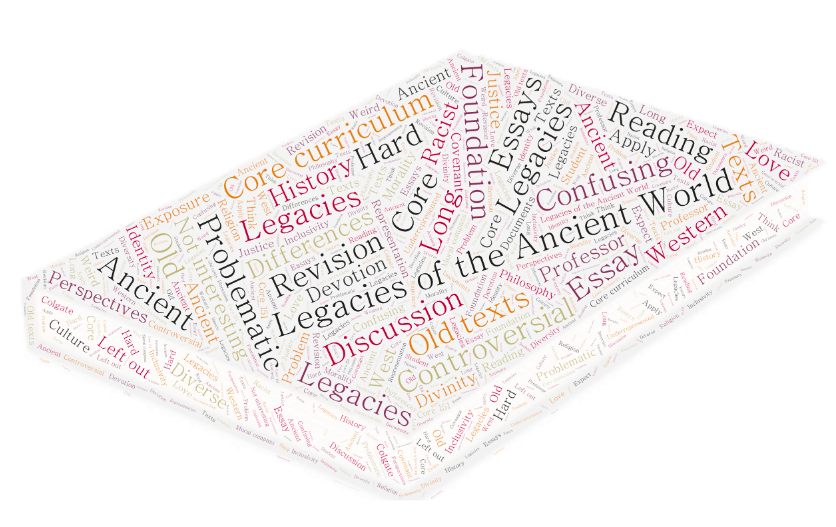CORE 151: To Change or Not to Change
Legacies of the Ancient World is a controversial requirement of the core curriculum at Colgate University. Many disputes pertaining to Core 151 originate from the restricted, Eurocentric nature of the reading requirements. Some feel that the lack of exposure to diverse texts limits the course’s ability to function as a foundational class, and that the texts are not representative of Colgate’s students or the broader world in which they live.
While a complete overhaul of the reading list may not be feasible during this revision, change must be made to this course. Legacies should either be specified as only foundational in terms of books that contradict our modern perceptions of the world, or the title of the course should be revised to better reflect its teachings.
The Formative Value of “Weird” Ideas
The purpose of Core 151 is to “provide an intellectual foundation shared by students,” where they engage with “ancient texts that articulate perennial issues” of divinity, justice, beauty, etc. Professor Alan Cooper, former director of Core 151, argues that the literature read in Legacies should not be considered Western or Mediterranean, but instead as “weird” books that contain ideas that contradict modern perceptions of society, prompt critical thinking about why they have become so prominent, and force us to examine their legacy. In class, we discussed how The Odyssey and the Hebrew bible are surprising because we expect them to align with our current ideals, but instead we see the portrayal of a jealous god and watch the “hero” Odysseus commit mass murder.
Instead of trying to fit the class literature into a chronological or geographical context, the books should connect to the course through their “weirdness.” A modified perspective on the reading list would allow the course to become more open to the incorporation of texts from other areas of the world such as The Tao Teh Ching teachings of Lao Tzu or the philosophy of Confucius. This diversification and change of view would allow students to obtain a more comprehensive sense of how philosophical thought developed throughout the world.
A True Foundation?
If Core 151 cannot be revised to live up to the “World” part of its name, the title of the course should be changed to more accurately reflect its content. The 2009 revision proposal emphasizes how “Colgate students today are increasingly diverse and bring with them new expectations appropriate to the times in which they live.” Furthermore, it also reveals how the structure of the core curriculum often places the “West” at odds with the rest of the world such that “it appears that ‘modernity’ is only a Western phenomenon.” Despite highlighting numerous flaws, the 2009 revision resulted only in a name change, from “Western Traditions” to “Legacies of the Ancient World,” without any significant updates to the course itself.
If fundamental change cannot be agreed upon during the current session, revision members should have the courage to reword the course title to more accurately reflect its focus on the Western world. Although a name change might be a step in the right direction, it does not excuse the lack of cultural diversity in the required readings. The representation of only Greco-Roman and Judeo-Christian texts calls into question whether Legacies is a true pillar of the core curriculum. Sole exposure to Western books while simultaneously calling the course a “foundation,” implies that a strong academic foundation on universal human themes can only come from Western texts. A current Colgate student voiced her concern that, “If [Legacies] doesn’t include diversity at the base level, how are we as students supposed to manifest this in other classes and in the broader world?” For Core 151 to truly be foundational, it must reflect and address the diversity of its students and the world they are about to enter.
The Revision
The call for revision of Core 151 is not new, and comes from students, faculty, and alumni alike. Many have argued that Colgate should “offer exposure to a variety of texts and voices from a wide range of traditions” and include texts from more diverse schools of thought. A significant obstacle to implementing such revision is that some faculty believe so strongly in the benefits of the current approach, they might cease to teach Legacies if “forced” to change. Nevertheless, common ground must be reached to produce a revision that addresses the subtle assumption of Western dominance. Either a change in perspective accompanied by the diversification of the curriculum, or a name change must be implemented to keep the course in line with Colgate’s ideals of Diversity and Inclusivity. Core 151 should no longer be allowed to fall short of its title, Legacies of the Ancient World.

Word cloud of key words from interviews with one member of the faculty and six Colgate students who have previously taken Core 151. It is interesting to view the bigger words such as Ancient, Revision, Discussion, Problematic, and Confusing. These larger words represent high frequency phrases and reveal a general attitude towards Core 151.
Willow Goff (Author)
Hello, I am a sophomore at Colgate University with an intended major of Molecular Biology and minor in Chemistry. Outside of the sciences, I also enjoy the arts and enjoy community service. I hope to blend my interests to promote self-growth throughout my liberal arts education.